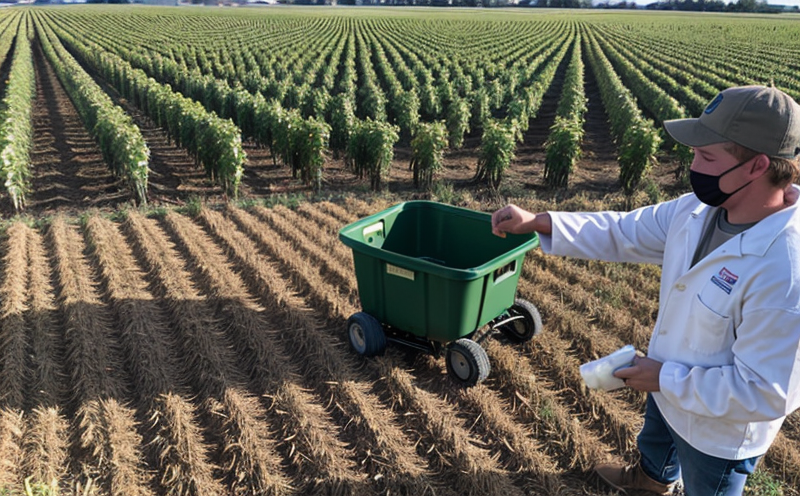Post-Harvest Loss Assessment Testing
The post-harvest loss assessment testing is a critical service within the broader scope of agriculture and forestry quality control. This testing ensures that agricultural produce maintains its optimal quality from harvest to consumption, thereby minimizing losses due to spoilage or degradation during storage, transport, and distribution.
Post-harvest losses can be attributed to various factors such as physical damage, microbial activity, enzymatic processes, and environmental conditions. These losses are not only economically significant but also have a direct impact on global food security. By assessing these losses through scientific methods, we provide actionable insights that enable stakeholders in the agriculture sector to improve their supply chain efficiency.
The testing process involves several stages tailored specifically for post-harvest produce, including apples, oranges, tomatoes, and other fruits and vegetables. During this process, produce is subjected to a series of tests designed to evaluate its freshness, shelf life, and overall quality. These tests may include:
- Visual inspections for signs of physical damage or bruising
- Brix measurements to assess sugar content
- Volumetric analysis to determine moisture retention levels
- Respiration rate testing to monitor metabolic activity
- Microbiological analyses to detect spoilage organisms and pathogens
The data collected from these tests is then used to establish benchmarks against which future produce can be compared, ensuring consistent quality across batches. This service is essential for compliance with international standards such as ISO 17025, which governs the competence of testing laboratories.
By implementing a robust post-harvest loss assessment strategy, organizations in the agriculture sector can enhance their operational efficiency and reduce waste. This not only benefits individual companies but also contributes to sustainable practices that support global food security objectives.
Why It Matters
The importance of post-harvest quality testing cannot be overstated, especially in light of the increasing demand for fresh produce worldwide. Each year, billions of tons of agricultural products are lost due to spoilage or damage after harvest. These losses have profound implications on food availability and economic stability.
For instance, according to the Food and Agriculture Organization (FAO), approximately one-third of all food produced for human consumption is lost globally each year. In many developing countries, post-harvest losses can account for up to half of total production. This translates into significant financial losses for farmers and processors alike.
Moreover, reducing these losses would have a direct positive impact on environmental sustainability by minimizing resource use associated with wasted crops. Efficient post-harvest handling practices could also contribute to better management of agricultural inputs like water and fertilizer.
Incorporating rigorous quality control measures into the supply chain helps ensure that only high-quality produce reaches consumers, promoting healthier eating habits while reducing waste at home as well.
Quality and Reliability Assurance
To uphold the highest standards of accuracy and consistency in our testing services, we employ advanced analytical techniques using state-of-the-art equipment. Our laboratory adheres strictly to ISO 17025 accreditation requirements, ensuring that every test result is reliable and repeatable.
Our team comprises experienced professionals who understand the nuances of each product type being tested. They work closely with clients throughout the entire testing process, from sample collection to final reporting, providing detailed feedback on how best practices can be implemented to reduce losses further.
We offer comprehensive reports detailing all aspects of our findings, including visual observations, numerical measurements, and recommendations for improvement based on current industry trends. These insights help guide strategic decisions aimed at optimizing operations within the agriculture sector.
By leveraging cutting-edge technology combined with expert knowledge, we strive to deliver precise results that reflect real-world conditions accurately. Our commitment to quality assurance is reflected in our adherence to stringent protocols and continuous training programs for our staff members.
Environmental and Sustainability Contributions
Reduction of food waste through early detection of potential issues leading to spoilage
Supporting sustainable farming practices by identifying areas for improvement in post-harvest handling processes
Promotion of resource-efficient operations within agricultural enterprises
Encouragement of recycling initiatives aimed at reusing any recovered materials from testing
Facilitating better-informed decision-making regarding supply chain management strategies
Enhancing public awareness about the importance of minimizing post-harvest losses in maintaining food security globally
Aiding in compliance with regulatory requirements related to quality assurance and safety standards
The implementation of effective post-harvest loss assessment testing plays a vital role in addressing these challenges, contributing positively towards both economic growth and environmental stewardship.





